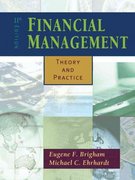a. The value of a warrant depends primarily on the expected growth of the underlying stock's price.
Question:
a. The value of a warrant depends primarily on the expected growth of the underlying stock's price. This growth, in turn, depends in a major way on the plowback of earnings; the higher the dividend payout, the lower the retention (or plowback) rate; hence, the slower the growth rate. Thus, warrant values will be higher, other things held constant, the smaller the firm's dividend payout ratio. This effect is more pronounced for long-term than for short-term warrants.
b. The same general arguments as in Part a hold for convertibles. If a convertible is selling above its conversion value, raising the dividend will lower growth prospects, and, at the same time, increase the "cost" of holding convertibles (or warrants) in terms of forgone cash returns. Thus, raising the dividend payout rate before a convertible's conversion value exceeds its call price will lower the probability of eventual conversion, but raising the dividend after a convertible's conversion value exceeds its call price raises the probability that it will be converted soon.
c. The same arguments as in Part b apply to warrants.
Step by Step Answer:

Financial Management Theory And Practice
ISBN: 9780324259681
11th Edition
Authors: Eugene F Brigham, Michael C Ehrhardt





